Body: EXTPump Manufacturer: HaleEngine: CumminsChassis: RBM CommanderTank Capacity: 750Pump Mount: SideHorsepower: 400Axles: SinglePump Model: QMAX-xs175-23L
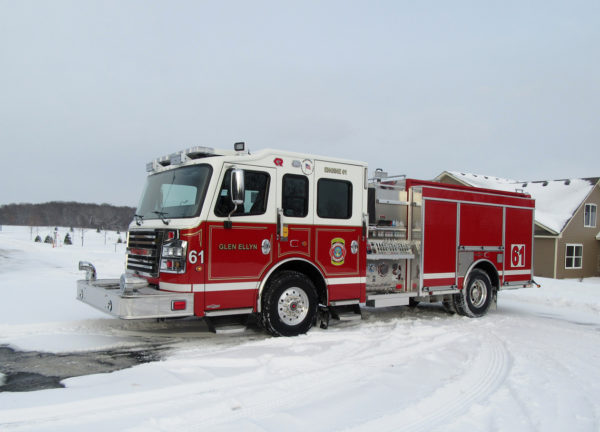
Rosenbauer photo
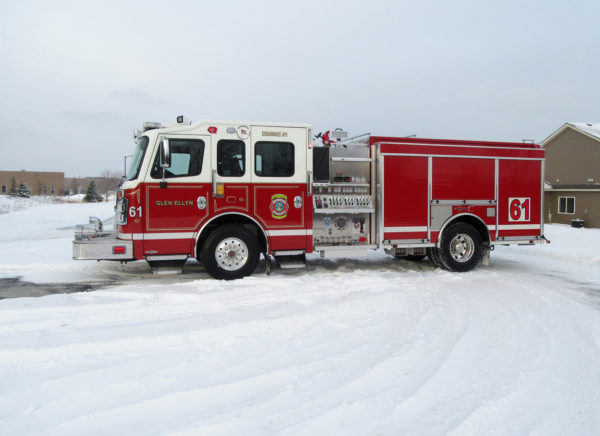
Rosenbauer photo
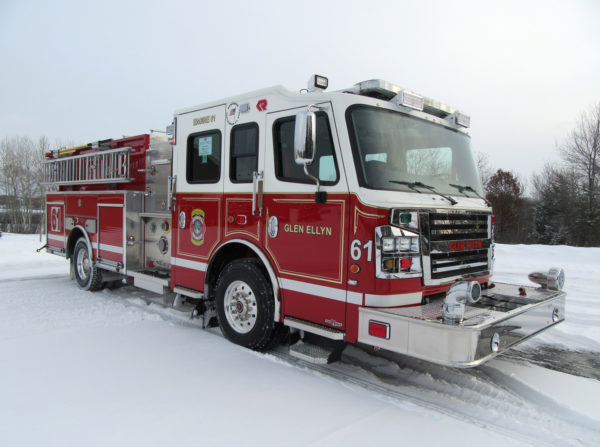
Rosenbauer photo
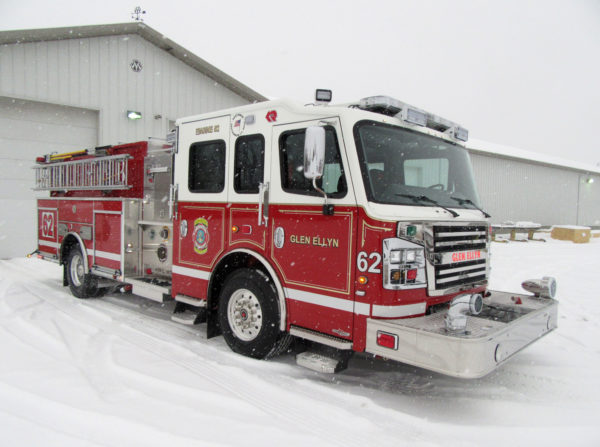
Rosenbauer photo
Jan 19
Posted by Admin in Fire Department News, Fire Truck photos, New Delivery | 4 Comments
Body: EXTPump Manufacturer: HaleEngine: CumminsChassis: RBM CommanderTank Capacity: 750Pump Mount: SideHorsepower: 400Axles: SinglePump Model: QMAX-xs175-23L

Rosenbauer photo

Rosenbauer photo

Rosenbauer photo

Rosenbauer photo
Tags: Glen Ellyn VFD orders new engines, Glen Ellyn Volunteer Fire Company, Glen Ellyn Volunteer Fire Department, Glen Ellyn’s Volunteer Fire Company, Rosenbauer Commander pumpers for Glen Ellyn
Excerpts from the Oaklawnleaf.com:
While the Village of Oak Lawn and the Oak Lawn Firefighters Union had 10 disputed issues in its recent arbitration litigation the main issue of minimum manning was decided in favor of the firefighters with the village once again losing the argument for fewer employees in the fire department.
On January 1, Arbitrator Steven M. Bierig, issued a 195 page decision that found in favor of the union on minimum manning and six other issues, while finding in favor of the village on two issues and allowing the court to determine the final issue regarding out of state residency.
Minimum manning is the most hotly contested issue between the parties and has been the subject of numerous arbitration and court hearings. Bierig wrote, “After a review of the evidence and arguments in this matter, I find that the village’s proposal regarding manning is not a breakthrough and that the village has failed to meet its burden to show that such a breakthrough is appropriate. For the reasons discussed below, the union’s status quo proposal is granted.” As noted by Bierig, the party that seeks a change in the contract has the burden of proving that a change is necessary in the status quo.
Bierig cited a Will County Case and applied a long standing test stating, “Arbitrators typically apply a 3-prong test that a party must meet in order to demonstrate that a major change in the status quo is needed: 1) the old system or procedure has not worked as anticipated when originally agreed to; or (2) the existing system or procedure has created operational hardships for the employer or equitable or due process problems for the union; and (3) the party seeking to maintain the status quo has resisted attempts to bargain over the change (i.e., refused a quid pro quo).”
Despite the village arguing that the minimum manning number was in excess of what is necessary to protect the village, the arbitrator applied the three factors to uphold the number. He said the minimum manning number has worked as intended. He noted that it was uncontested that the village has been fighting fires with 21 employees on a shift. The village argued that the number should be reduced to 19 members per shift and that the number was imminently reasonable. The village presented an expert witness who testified that the village could function with three rather than four employees per engine. The firefighter’s union countered the argument noting that the system of having 21 employees has worked well for the village’s safety.
The firefighter’s union argued that the Village of Oak Lawn is obtaining excellent fire protection and the current staffing is working exactly as it was intended. Further, the union contends that the evidence shows that by implementing the plan that the village requested would be counter intuitive. According to the union’s argument, It would actually impede the ability of the village to effectively respond to fires.
As an example, the union noted that with 4 employees on an engine, one company can arrive at a fire and immediately begin to fight it. “Further, if the village’s proposal was implemented, it would require 2 pieces of equipment in order to begin to fight a fire, which is not the most efficient approach to fire fighting. By having to rely more heavily on mutual aid, it places the citizens of the village in a vulnerable position in which, at times, it must rely upon the willingness of a neighboring community to assist. This is not feasible and should be rejected.”
The union also presented an expert witness who testified that 4 employees on an engine is far preferable to 3 in terms of fighting fires. The expert explained that the fact that some departments do use 3 firefighters on an engine does not mean that 4 is not a preferable number.
The village’s argument that the change in minimum manning was a minor change was discarded by the arbitrator finding that the proposal to reduce the minimum manning number was a major modification. The opinion stated:
The union has also presented substantial evidence to show that by moving from 4 to 3 employees on an engine, the residents of the village would be placed in a vulnerable situation that would endanger lives.
Bierig noted that the amount of employees on a shift has dated back for over 24 years to 1992 when the late Mayor Ernie Kolb served in office. Bierig wrote that the change from the existing number of 21 would be “a significant departure from the existing provision” based on the long standing agreement. In finding for the union on the issue, the arbitrator stated that the village’s wish to reduce the minimum manning was based on an economic reason and not an operational issue.
The arbitrator rejected the village’s claim noting that he could not find that the existing minimum manning number created operational hardships for the village. The arbitrator also rejected the village’s long standing contention that the union has refused to address the issue at the bargaining table. Village Manager Larry Deetjen has stated many times that the union would not bargain with the village.
The union, according to the decision, contended that while the village has made proposals to the union regarding manning, those proposals were not of sufficient value for the union to seriously consider reducing the number of personnel on an engine.
Bierig referred to previous arbitration disputes between the parties and noted that Arbitrator Benn was confronted with the same issue in the prior case between these parties. Bierig wrote, “In rejecting the same issue, he held: The village seeks a sea change to the manning system – specifically, the ability to reduce minimum manning from four to three employees on an engine, i.e., a 25% reduction – when the system has been in place for 20 years and was formulated with the mutual intent ” … for purposes of efficient response to emergency situations and for reasons of employee safety… ” with a mandate that if those agreed upon levels are not met, ” … employees shall be hired back pursuant to Section 6.4. ‘Overtime Distribution’” as expressed in Section 7.9(a) of the Firefighter Agreement [emphasis added]. The village does not seek this sea change because the manning system is operationally broken. Rather, the village seeks this sea change because the manning system is costly. That is not a basis for an interest arbitrator to change such a safety provision as important as minimum manning. Where one party (here, the union) seeks to maintain the status quo and there is no demonstration by the party seeking the change (here, the village) that the system is broken, that kind of change must come through the bargaining process.”
The union won 7 issues outright, while the village won 2 of the disputed issues. One issue, regarding out of state residency will be decided by the courts in February. The village’s offer on wages was accepted. The village’s proposal on extra duty pay and responsibilities to keep the status quo in the contract was also accepted by the arbitrator.
thanks Dan
Tags: arbitrator sides with Firefighter union on staffing in Oak Lawn, fire department fights staffing cuts, fire department staffing levels, Oak Lawn FIre Department
Jan 19
Posted by Admin in Fire Department News, New Delivery | 2 Comments
This from the Buffalo Grove FD:
The new fire trucks are at the dealer in Indiana. We are hoping to take delivery around the end of the month.
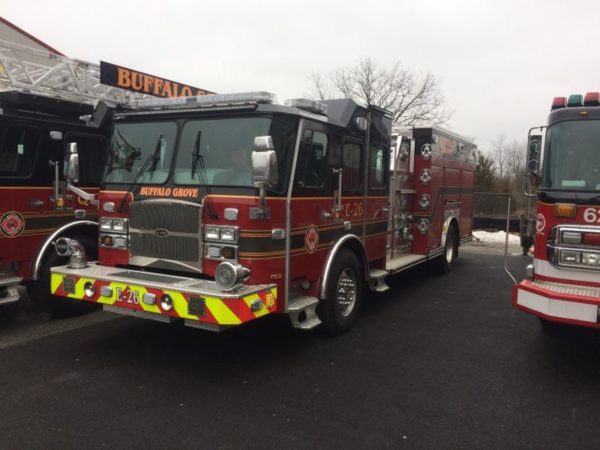
Buffalo Grove FD photo
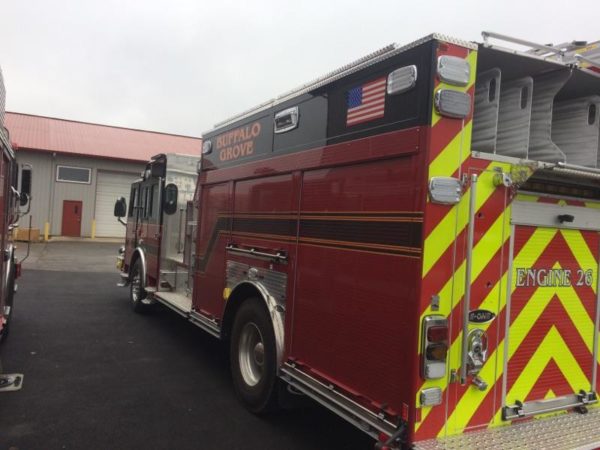
Buffalo Grove FD photo
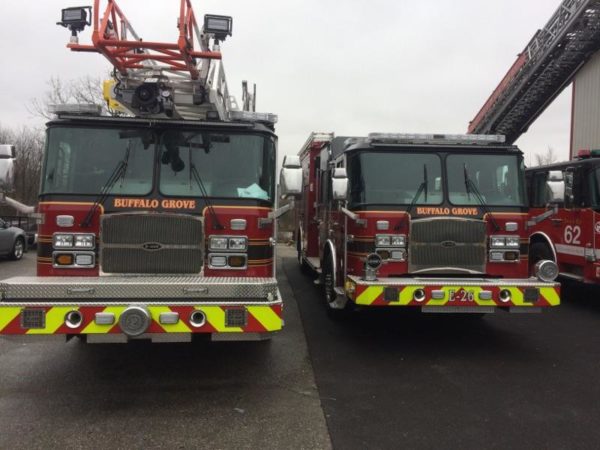
Buffalo Grove FD photo
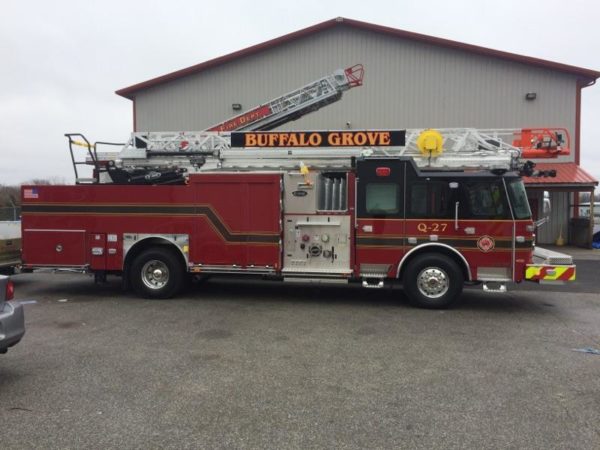
Buffalo Grove FD photo
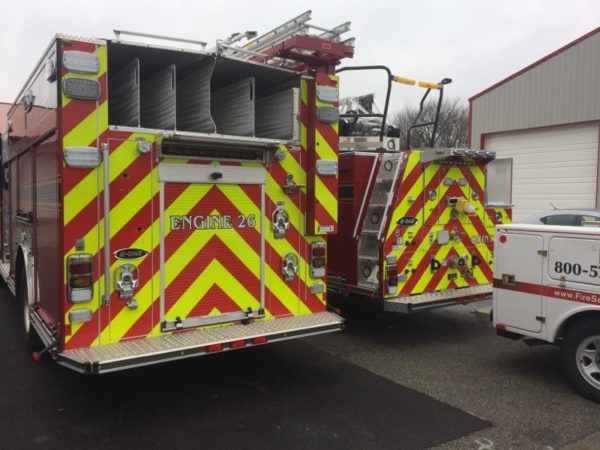
Buffalo Grove FD photo
thanks Andy
Tags: Buffalo Grove FD Engine 26, Buffalo Grove FD Quint 27, Buffalo Grove Fire Department, Buffalo Grove Fire Department orders new apparatus, chicagoareafire.com, E-ONE fire trucks, fire truck being built, fire truck being built for Buffalo Grove, photos of fire truck being built
Excerpts from WGNTV.com:
A Chicago firefighter was injured after falling at a house fire in the city’s South Austin neighborhood. The fire started in the back of a house on the 4800 block of West Ferdinand Street around 11:30 p.m. Tuesday.
The firefighter was on the second floor at the time of the fall, and leaned on what he thought was a wall but instead was a window. He fell two stories and was transported to Stroger Hospital with three broken ribs in his back and one in the front.
His injuries are said to be non-life-threatening.
thanks Dan
You are currently browsing the archives for Thursday, January 19th, 2017

For the finest department portraits and composites contact Tim Olk or Larry Shapiro.
Arclite theme by digitalnature | powered by WordPress